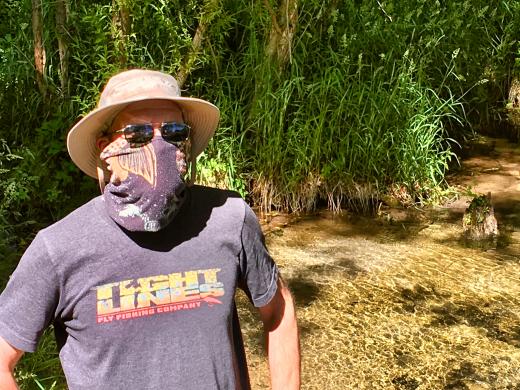July Chairs Column - Look Back, Pause, Then Look Forward
History has been weighing on me lately. For over a year now, I’ve been trying to visualize the setting and tease out details of the State Council’s 50th Anniversary Celebration.
I envisioned a large gathering of outdoor enthusiasts on the banks of one of our more fabled trout waters – or maybe even a Great Lake. We’d remember that 50 years ago, representatives from our earliest TU Chapters (Green Bay, Wolf River, Southeastern WI, and Southern WI) came together and formed the Wisconsin State Council of TU.
We’d recognize that the threats many of our coldwater resources faced then (dams, water withdrawals, mining, public access) are still threats today. We’d make analogies of brook trout being the “canaries in the coal mine” and add climate change to the list of challenges our watersheds face.
We’d rejoice in the expansion of TU in our state. We now have 21 local chapters who’ve taken it upon themselves to protect their home waters. But water doesn’t recognize the lines on our maps, it only reacts to gravity. In order to be effective, we have to work on both the local and state levels.
We’d thank these Chapters for supporting the Council, and acknowledge the Council’s duty in serving these Chapters. The Council amplifies the conservation message and strengthens local efforts to protect our watersheds.
Having reflected upon our past, and reaffirmed the Council’s role in sustaining our coldwater resources, we would raise a glass, and look forward to the next 50 years!
At least, that’s how I pictured it playing out. Then COVID19 hit and things haven’t been the same since.
Three months of being safer at home has brought some new perspective. We’ve done our part to protect our family and those around us in our community. We’ve been spending more time outdoors – not days or weeks at a time, but short daily jaunts exploring nature close to home.
I’m definitely a person who needs to be near the water – wading in it, hiking by it, paddling on it. It’s my connection to the natural world. Keeps me grounded and gives me a sense of place.
Turns out, a lot of folks have been reconnecting with nature. Our public lands and our public access to water have never been more important. We’ll need all of these voices in our effort to renew Knowles Nelson Stewardship – Wisconsin’s iconic public lands program and the source of all those white and green “public fishing easement” signs.
I believe TU has a role to play as we start back down the path to “normal”. I for one am ready to volunteer again – cutting brush, rolling rock, cleaning up trash, or whatever our local waterways need. Our TU workdays could be just the outlet many people are looking for. We can offer this opportunity to “do some good” while being respectful of everyone’s health (face coverings, keeping our distance, and skipping the communal lunches).
The people in this organization are what I miss the most. Sharing moments on the water and sharing those stories afterwards. I know it’s been difficult to function as an organization these last few months, but I’m convinced that TU will come through this moment as a stronger organization.
The strength will come from opening our doors a little wider. It’s not enough to come through this pandemic and go back to normal. Normal will not keep us relevant over the next 50 years. We need to be extraordinary if we are to preserve the woods, meadows, and waters that we cherish for future generations.
So what does it mean to “open the doors a little wider”? I’m a white male in my mid-40’s and I’ve never really had a problem fitting into this organization. That’s not the case for a lot of people who may be of a different gender, or race, or generation.
I feel most comfortable knee deep in a trout stream. What makes me UNcomfortable is realizing that not everyone feels at ease recreating outdoors. It’s up to us to change that.
We have the tools in place (Trout in the Classroom, Youth Conservation and Fishing programs, 5 Rivers College clubs, Diversity and Women’s Initiatives, citizen science, and restoration workdays) to start breaking down barriers.
It’s our responsibility to make space in TU for all voices to be heard. This organization has a way of bringing out the best in people. If we want our work to mean something in 50 years, we will have to evolve. Everyone deserves access to cold, clean, fishable water.
I’m looking forward to helping the next generation of conservationists rise up and occupy their space in the outdoor community, so that we can continue building our coldwater legacy. Are you with me?
Much Respect,
Mike Kuhr
State Council Chair


